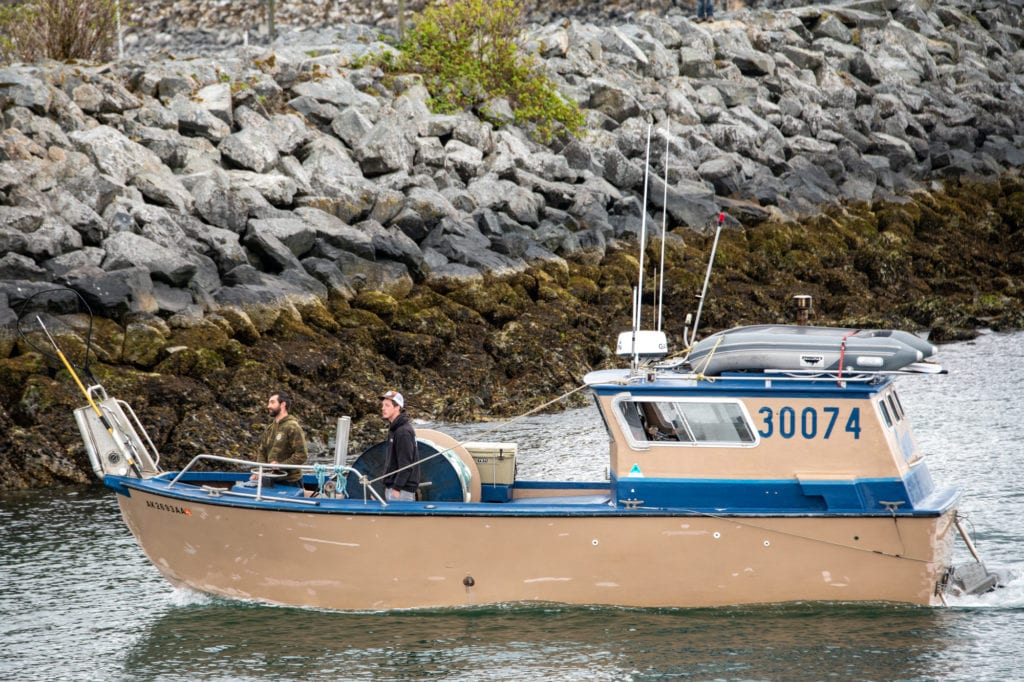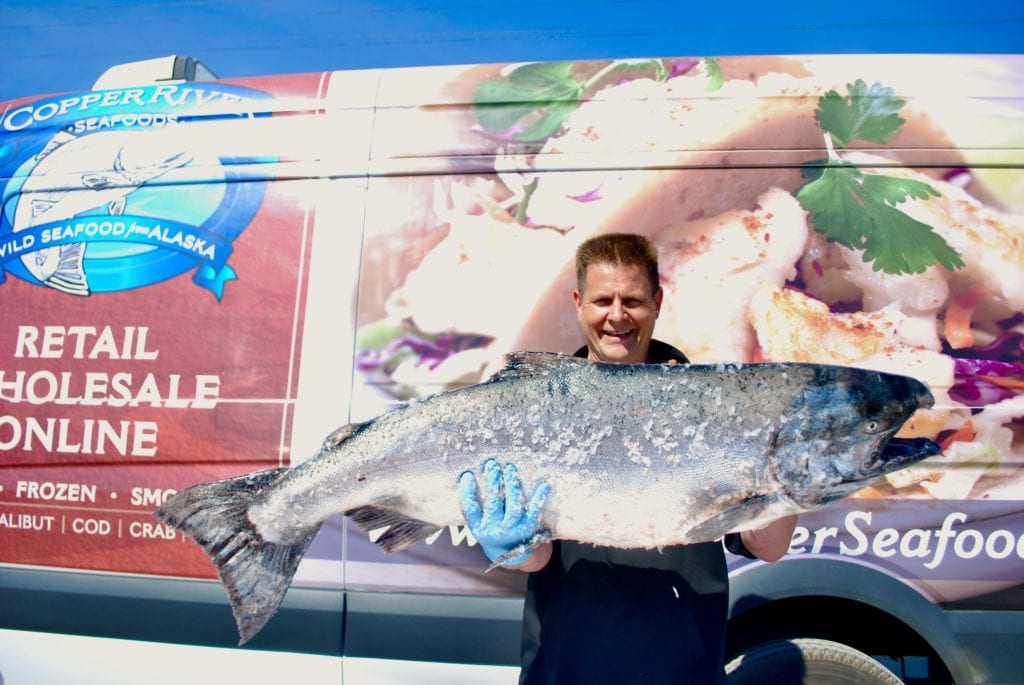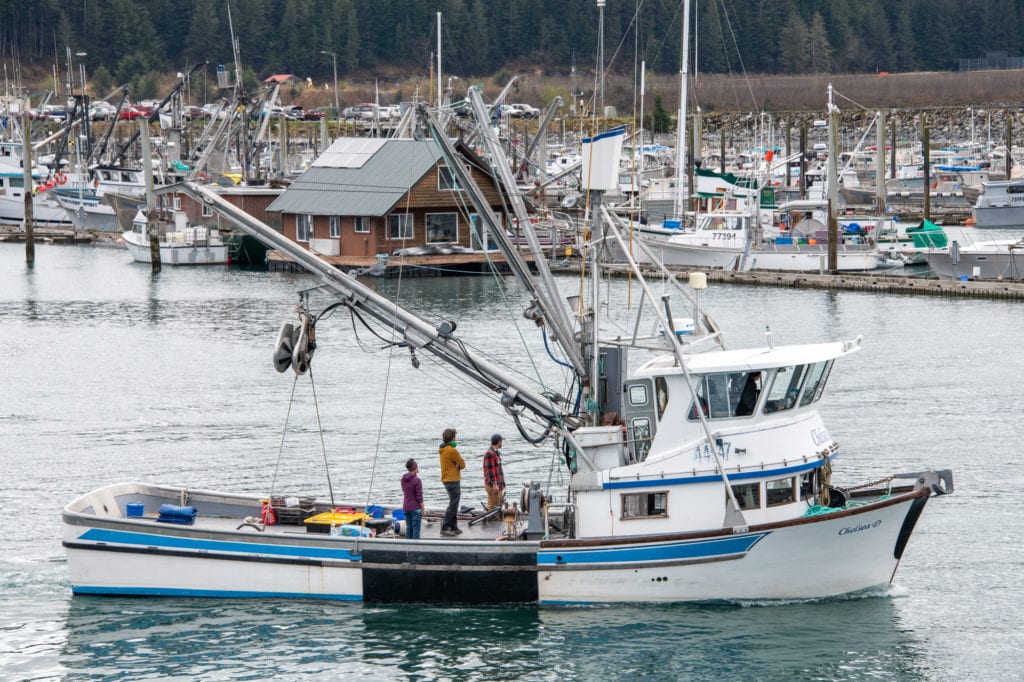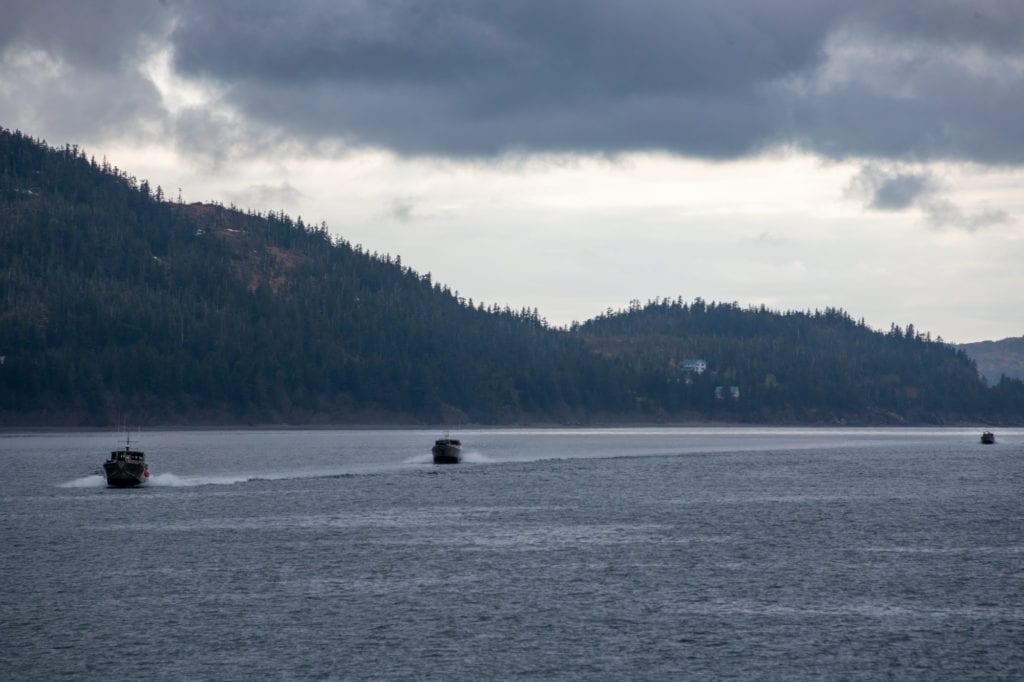
Opening harvests of the 2020 Copper River commercial fishery, complicated by effort to keep the COVID-19 pandemic at bay, got off to a slow start for the first two 12-hour openers.
The overall catch of Chinook and sockeye salmon came in way below forecast.
The first two 12-hour periods brought processors an estimated 6,025 sockeyes and 3,255 king salmon, Alaska Department of Fish and Game biologists said.
The 372 deliveries from the first opener on May 14 included just 1,473 sockeyes and 1,552 Chinooks. Then on May 18, there were 412 deliveries, with 4,552 sockeyes and 1,703 Chinooks. The projected harvest for the second period alone had included 28,590 reds.
At that point ADF&G, concerned about meeting allocations for in-river fisheries, escapement and hatchery needs, opted to close the fishery Thursday, May 21, with plans to announce on Friday, May 22 whether there would be a third opener on Monday, May 25.
The water is cooler than normal, which could be one possible explanation for the small harvest to date, or it could be simply a matter of a smaller run than anticipated, said Jeremy Botz finfish area management biologist for ADF&G in Cordova, who was holding out hope that the fishery will come up on some peak timing over the next couple of weeks.
Red salmon were averaging five pounds, and the kings about 13.5 pounds, Botz said.
The Bering River District also remained closed to commercial fishing until further notice.
ADF&G meanwhile had Miles Lake sonar up and running on both banks and 24-hour counts were to begin at midnight of May 19. The Prince William Sound Science Center’s Lower Copper River sonar station was also operational near the mouth of Clear Martin River on the lower east side of the Copper River, with fish passage summaries available for viewing at pwssc.org/2020-lower-copper-sonar.

Low harvests and rainy weather aside, Cordova continued to hold its own in keeping at bay the novel coronavirus, which has infected millions of people worldwide and killed thousands in the United States alone.
“I believe everyone is working very hard to ensure the community and fisheries are protected,” said Dr. Hannah Sanders, a family practice specialist and medical director at the Cordova Community Medical Center.
“We are ready to adapt to the challenges as they come,” Sanders said in an email response to questions. “Alaska has responded very aggressively to the threat of COVID-19. As a result, the state currently has capacity to assist smaller communities when and if the need arises. If this changes, Cordova will respond quickly to protect our community.”
As of Tuesday, May 19, Alaska had a total of 399 people infected with COVID-19, out of 36,380 tested. Three hundred and 48 of those infected have recovered, and 43 had been hospitalized. The death toll remained at 10.
Gov. Mike Dunleavy, under pressure to get a stalled economy moving again, announced that Alaska would be fully open for business effective at 8 a.m. Friday, May 22. Phases 3 and 4 of the reopening plan were activated simultaneously, including restaurants, bars, retail shops, gyms, libraries, museums and more, “just like it was prior to the virus,” the governor said. Individual communities meanwhile could still impose their own restrictions, he noted.
Since the pandemic mandates went into effect in Alaska the number of people who have been laid off temporarily or lost their jobs has soared. Thousands have applied for unemployment insurance and food banks have seen a huge demand from those faced with food insecurity.
Dunleavy urged everyone to keep the virus at bay by avoiding any unnecessary contact with others, washing hands often, wiping down frequently touched surfaces and staying home when not feeling well.
“We just need folks to be really vigilant and aware that this virus can jump from one person to another if they’re closer than six feet, if surfaces aren’t wiped down, if you’re shaking somebody’s hand, etc.,” he said. He also urged that those working remotely, rather than in their office, continue to do so if possible.

The mandate requiring a 14-day quarantine for all people entering Alaska, including returning residents, remains in effect until June 2. Also, still in effect are health mandates on interstate and international travel, public and private schools, elective medical and dental procedures, commercial fishing, and intrastate travel.
Dr. Anne Zink, the state’s chief medical officer, said Alaskans should to continue with COVID-19 precautions, including face masks.
Dunleavy said that state health officials remain in constant communication with Bristol Bay area officials regarding their concerns for mandatory pre-arrival quarantining and testing for fishermen who are arriving daily in advance of the Bristol Bay sockeye salmon fishery.
“Nothing is foolproof,” Dunleavy said. “We are going to do the best we can, but anything short of individuals living very isolated until there is a proven vaccine which could be a year or a year and a half, we have to learn to live with it and manage it.”
To date, both Cordova and Dillingham have had one non-resident seafood processing worker each diagnosed with COVID-19. In both cases these individuals had had temperature checks and interviews before coming to Alaska and both were doing their 14-day quarantine, in Cordova and Dillingham respectively, when they tested positive for the virus. Both were asymptomatic.
Trident officials said that all incoming seafood processing workers would now be doing their 14-day quarantine in Anchorage and be retested before heading for rural seafood processing locations, with the exception of Ketchikan and Petersburg, where they would be individually isolated for their quarantine in those communities.
Alaska Commissioner of Health and Social Services Adam Crum said that commercial fishermen heading to fishing grounds via Anchorage are now being tested for COVID-19 at Anchorage International Airport and said they should plan to stay in Anchorage an extra day or so to await test results.
New cases of virus infection over the past two weeks have all been at most in the single digits.
“The numbers don’t justify us doing anything but opening up,” Crum said. “We have weathered the surge but yes, we need to open up.”
Concerns over a potential low price for the prized Copper River kings and red salmon combined with worries over the pandemic have lowered the competition for the fish, said Cordova Mayor Clay Koplin, who calculated that as much as one fourth of the fleet never left the harbor for the first opener.
Still that harvest was substantial enough to ship a load of reds and kings onto an Alaska Air Cargo flight to Seattle for grocery stores nationwide and to honor more than 200 health care workers at Swedish Medical Center in Seattle with a gourmet seafood dinner.

Alaska Airlines, Trident Seafoods, Ocean Beauty Seafoods, Copper River Seafoods, the Copper River Marketing Association and famed Seattle chef Tom Douglas collaborated to bring dinner to the health care workers on the frontline of medical care for pandemic patients.
On Sunday, May 17, there was a “Grilling for Good” fundraiser in which Douglas and Trident Seafoods teamed up to prepare grilled Copper River sockeye entrees available for purchase through the Tom Douglas website, tomdouglas.securetree.com/Events/Grilling-for-Good-Copper-River-Salmon-Meal with all proceeds to be donated to Food Lifeline.
Seattle’s famed Pike Place Fish Market was advertising Copper River king fillets for $74.99 a pound, whole Copper River kings for $659.99 apiece, Copper River sockeye fillets for $49.99 a pound and whole Copper River reds for $174.99.
Costco stores in Anchorage still had plenty of previously frozen fillets of sockeye salmon for sale at $9.99 a pound, plus fresh whole Copper River reds for $9.99 a pound.





